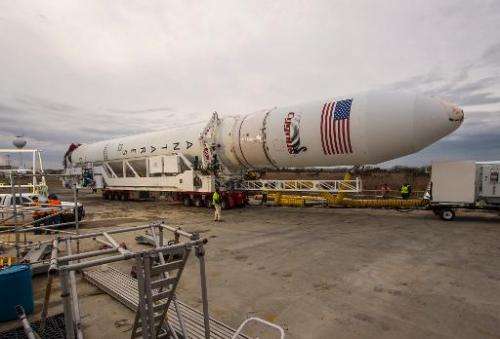An Orbital Sciences Corporation Antares rocket is rolled out to a launchpad at NASA's Wallops Flight Facility on January 5, 2014
The first regular contract flight of Orbital Sciences' unmanned cargo ship to the International Space Station was expected to launch Thursday, following a 24-hour delay.
The Cygnus spacecraft was scheduled to take off from Wallops Island in Virginia at 1:07 pm (1807 GMT), carrying 2,780 pounds (1,260 kilograms) of gear including science experiment equipment, supplies and hardware.
Weather forecasts suggested there was a 75 percent chance of favorable conditions at the projected time of takeoff.
Wednesday's postponement was made over fears that high levels of space radiation from solar flares—bursts of magnetic energy that originate on the Sun—might interfere with the Antares rocket's electronics, unleashing radiation that could affect radio signals, GPS and satellite communications.
The company said launch prospects looked good on Thursday.
"Everything is going smoothly at this point," said Barron Beneski, Orbital's vice president of corporate communications, three hours before the anticipated departure. "All systems are go, including terrestrial weather."
Cygnus should reach the international space outpost on Sunday.
An attempt was previously delayed in December due to a cooling system breakdown at the ISS, which required American astronauts to make two spacewalks in order to replace an ammonia cooling pump.
When the launch goes ahead, it will mark the company's second trip to the orbiting outpost, following a successful demonstration launch in September.
That mission proved "that the company can reliably carry out regularly scheduled operational missions to the ISS for NASA," said David Thompson, Orbital's chairman and chief executive officer.
Orbital has a contract with NASA worth $1.9 billion for eight cargo resupply missions to the global space lab.
Orbital and SpaceX are two private companies that have stepped in to ensure the United States' ability to reach the orbiting outpost, after the retirement of the 30-year space shuttle program in 2011.
© 2014 AFP























